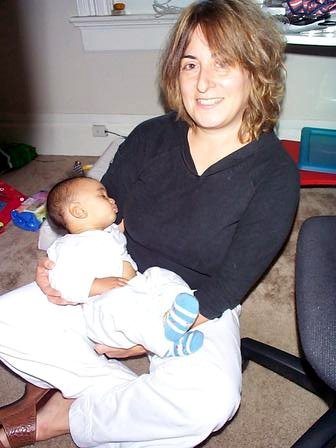Olympics (San Francisco, 1992)
In San Francisco, I earned eleven dollars per hour and was supporting both of us on that, so we ate a lot of cabbage, eggs, and red adzuki beans. But oh! He’d grind the spices in a black volcanic stone mortar from the Singaraja market, in that tiny Victorian kitchen in the Western Addition, standing there wrapped in only a maroon ikat sarong tied around his small waist, light reflecting off the golden curve of his back.
First he’d toss a dash of salt in the concave center of the mortar, then peel two pieces of garlic and smash them with the wooden end of a cheap Chinatown knife until they oozed, shave the thin brown skin off fresh ginger and chop up its sinewy light green flesh into smash-ready chunks, cut translucent slivers of shallot, pinch off a corner of dried shrimp paste, and finally slice up tiny Thai chilis into circles of red and green. It all looked beautiful just before the final grinding, the reds and greens and whites tossed carelessly but arranged just so, a quick flash of beauty ready to submit to the pestle, to blend together into sharp tastiness.
Oil sizzled in the pan and he’d dump in the spices and the air was pungent with the smell of fried shallots and shrimp paste and hot chili, a smell that never really left the places where we lived. He’d fill the pan to overflowing with cabbage, and the runny eggs would fluff up as they cooked. The adzuki beans would boil in a spicy soup, like the soup his mother used to serve us in the kubu, spicy to make you feel as if your hair were about to fall out and your lips burned. The whole meal didn’t cost more than five bucks.
The first night he came to San Francisco, we missed dinner. Since he came in 1992, it was an Olympic year. At the airport, when he walked off his flight from Denpasar, he looked different, smaller and more boyish in his green cotton button-down shirt, his face filled out, his cheekbones a little less prominent. His thick dark hair had grown long and he smelled of coconut oil. We stood there for a moment, just staring, shy, and then I fell into his arms and he wrapped his long arms around my waist.
Our roommates were not home, at least I don’t remember them being there. We lay on the living room floor in front of the TV to watch the summer Olympics, because it seemed too sudden to go directly to the bedroom after months apart. I didn't care that the carpet was ugly and smelled of beer. There were bay windows that looked out into a courtyard. On TV, swimmers dove elegantly into the pool, sliced their powerful arms through the water, as the announcer droned on, and then we were tracing each other’s faces, remembering each other’s strangeness. I almost felt sick as my body got used to his again. His nose was flat as a boxer’s. The announcer’s voice receded into the background. His long dark hair blinded me and I held it around my face so it would keep covering me, to keep me from seeing anything beyond it. His fingers no longer felt strange. His skin, softer than mine. Streamlined bodies moving through heavy water, from one side to the other, lighter than if they walked on earth. Swimming, swimming, flying through the water, swimming, flying, swimming, flying. The announcer is saying something. I can't see or hear. In my imagination they're almost to the other side, they're touching the finish line like it's a new continent. Gold, silver, bronze.

